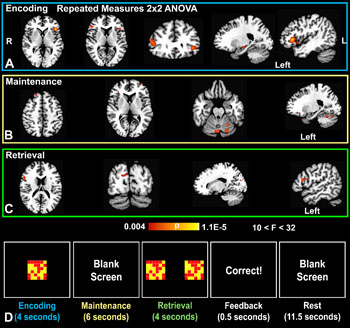Scientists Use fMRI to Investigate How Methylene Blue Improves Short-Term Memory
By MedImaging International staff writers
Posted on 05 Jul 2016
Researchers have found that even a small oral dose of methylene blue can increase responses in parts of the human brain used for short-term memory.Posted on 05 Jul 2016
Methylene blue is used to treat a blood disorder called methemoglobinemia, and for staining tissues. Scientists have known for more than 40 years that methylene blue can enhance memory in animals, but this is the first time that the underlying changes in the brain have been studied in human subjects.

Image: The results of a novel study investigating the effects of methylene blue on short-term memory (Photo courtesy of RSNA).
The results of the study were published on June 28, 2016, in the online issue of the journal Radiology by researchers at the University of Texas Health Science Center (San Antonio, TX, USA). Participants in the double-blinded, randomized, clinical trial underwent Functional Magnetic Resonance Imaging (fMRI) before administration of a low-dose of methylene blue, or a placebo, and again one hour afterwards. The 26 healthy participants aged between 22 and 62, were also asked to perform tasks as part of the study. The results showed that there was a seven percent increase in memory retrieval, and increased response in parts of the brain associated with attention and short-term memory.
The author of the study, Timothy Q. Duong, PhD, University of Texas Health Science Center, said, “Although the memory-enhancing effects of methylene blue were shown in rodents in the 1970s, the underlying neuronal changes in the brain responsible for memory improvement and the effects of methylene blue on short-term memory and sustained-attention tasks have not been investigated. Our team decided to conduct the first multi-modal MRI study of methylene blue in humans. This work certainly provides a foundation for future trials of methylene blue in healthy aging, cognitive impairment, dementia and other conditions that might benefit from drug-induced memory enhancement.
Related Links:
University of Texas Health Science Center














